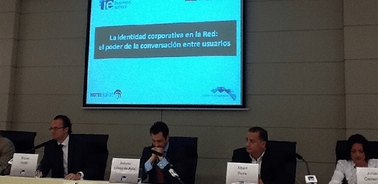- Home
- News And Events
- What’s Going On
- The Impact Of Technologies On The Tourism Sector Under Debate At Ie Business School
The impact of technologies on the tourism sector under debate at IE Business School

On May 6 the IE Tourism Club, IE Business School's Tourism Department and Magma Turismo held a workshop debate on The corporate identity of the Net: the power of conversation among users, to examine the impact of technologies on the tourism sector.
Speakers included leading executives such as Josiah Mackenzie, founder of HotelMarketingStrategies.com, Ronald Friedlander, CEO and Chairman of ReviewPro, Albert Barra, CEO of Hotel Juice, and Johava Cavalcanti and Juan Sobejano, co-authors of Social Media IOR: Las relaciones como moneda de rentabilidad . The workshop served to explore issues like the role of social networks in the tourism sector, changing consumer habits in the online environment, or the impact of online strategies on the sector.
For Josiah Mackenzie, founder of HotelMarketingStrategies.com, it is essential to understand why people share knowledge online - from sharing experiences to building a social profile or some other kind of help. Moreover, in his address he noted that it is important to fine-tune web2.0 content. Hotels have to let users do their marketing for them, but they need to "edit" content produced by clients. Information provided by users is key for sales and for gaining visibility for a business.
Ronald Friedlander, CEO and President of ReviewPro, remarked that online reputation is having an increasing impact on the hotel sector. Comments made by clients serve to gauge levels of satisfaction and the key lies in solving any reported problems quickly, letting them know that problem has been solved, and involving the whole team in the improvement process. The opinion of other users is a determining factor in the purchasing decision, says Friedlander.
Albert Barra, CEO of Hotel Juice and associate professor of IE's tourism department, stressed the importance of transmitting values - "The most important thing is to establish values that are easily transmitted and that clients make their own" - rather than simply showcasing the brand. He explained that success and competitiveness depend on "managing and attracting the customer" and in order to achieve this "it is vital to perform certain tasks: observe, monitor, respond, participate, add value". Barra insisted that this is increasingly important for businesses. "It should not be carried out by interns but rather by directors with a good working knowledge of the company's strategy."
Antonio López de Ávila, Director of the Executive Master in Tourism Management at IE Business School, rounded off the workshop by encouraging companies in the tourism sector to think deeper and build their knowledge of this new discipline. He underscored the dual importance of managing social networks. Firstly, because it is fast becoming one of the main channels of communication with customers, who are often young people who make extensive use of social networking to communicate and get information on any aspect of their lives, and secondly, because the information provided by customers also brings a big opportunity to improve. "They are our best consultants, and they do it free of charge."